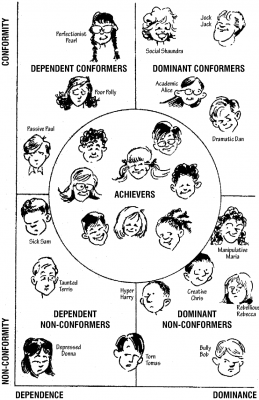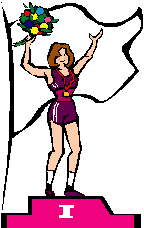 The world has never been so divided.
The world has never been so divided.
The dividing criteria is intellectual and spiritual abilities, the ability to tell truth from falsehood. To interact with reality the way reality is… not how it should be.
The stupid is becoming stupider, and the smart remains the same. Said in another way: the underachiever is stuck there… and more are joining him. 1
In this article I’ll look what may be a linchpin issue, and how you can start moving from the hopelessly stupid to the smart camp.
Here are a few contenders to being the linchpin issue:
- 1. wanting the world to be a yes/no world. good/bad, nice/ugly, etc. The hallmark of this is positive thinking. Or wearing rose colored glasses. Ultimately leads to underachievement.
- 2. wanting only to do what is strictly takes one to the goal… A “great” example to this is to only read articles that promise to deal with what you deal with, exactly. So, for example, you don’t want to learn about billionaires because you don’t want to become a billionaire. Or you don’t read my article on Queen Elizabeth, because it doesn’t seem relevant to you. And this approach reliably keeps you poor and destitute in every area of your life. Guaranteed. 2
- 3. being a one-plate spinner and insisting on it… you either do one thing or another. You can’t do your assignment, and track what you eat… that is too much for your tiny brain.
- 4. inability or refusal to experience difficulty, unpleasantness, or confusion.
- 5. Closely related to #2, but is said in a different way: you don’t want to take a wrong step… so you wait for clarity, or inspiration… analysis paralysis
I hope you noticed that all items in the list are attitudes, and not brain power.
People with the exact same “brain power” can be stupid and can be smart. 🙁
I am talking about 160 spiritual capacities that can be turned on and turned off by the person themselves.
The linchpin issue is always in the spiritual realm.
I call spiritual abilities the invisible abilities… they all answer the question: how?
How you approach things? How you look at them? How you allow them to be or not?
160. With 40 activated, you will be so head and shoulder above others with the same brain power, it’s not even the same world you live in.
Learning a profession to a level of being good at it, adds some of these capacities, more or less. The number depends on how many different plates you need to spin to get there, how complicated the subject matter is, how much effort you need to invest to get good.
Getting a college degree is not the same as learning a profession… and therefore a college graduate still sports no capacities to speak of.
It is a rare person who is self-directed, self-challenged, and activates spiritual capacities…
What is smart? You are smart to the degree that you can approach the good life. A complete life, a life of fulfillment, health, wealth, and love.
To the degree… I said. It is not that you are stupid or you are smart. It is a scale. And you can grow on it, or lose your position… as in anything.
You’ll develop capacities that help you win the competition you put yourself into. Against time, against your previous result, against other competitors…
Most people shy away from competition. Competition means getting feedback. Competition means knowing your relative position compared to the people you are competing with.
Your ability to face the piper, to know the truth, to work towards growth is most obvious from what competitive environments you are willing to put yourself in.
The best of the best became the best through competition, daily, hourly, minute by minute.
Competition is not pleasant. Maybe if you are the big fish in the small pond… but if you are, you are stupid, and you can only blame yourself for that.
The job is to attempt to climb bigger mountains and faster, all the time.
To the degree that you want life to be simple, two-bit, understandable, and smooth, to the same degree you forego competition, you forego growing.
Growing is not pleasant.
My programs are not pleasant… unless you consider growing fun.
I do.
I have chosen you to be my feedback system, telling me where I need to grow. And I hope that you’ll grow with me… so I can grow more.
I hope for synergy. Synergy is when one plus one is not two, it is 10.
At this point, our synergy produces two, not 10.
I am doing my darned best to nudge you towards growth, but you resist. Or slip out… slimy.
Most online schools suffer low completion rates, low results, because the competition, the environment of competition, the stimulation is hard to create online.
Even offline schools, like Landmark Education are low competition environment… unless. Unless the program is very intense, and unless the program has a visible scoreboard.
Unless you are exposed to other people’s results, and can see what that result looks like, you will always be locked into your narrow interpretation of what is good and what is better.
For example, in my current experimental course: From Upset to Communication:
We’ll learn to identify what field of communication we are, and learn to change the field at will, when it is advantageous.
All annoyance, all upset comes from the field itself, so being able to shift into another field at will, disappears the upset.
This is true all the time. All the unpleasantness disappears when one can change the field. Another name for the field is context, but when I say context, people’s eyes go unfocused…
So we stick with specific contexts, we call them fields. They are well-defined… but you need to become really familiar with those fields.
The tool for that is collages. NOT words… Collages are a Tree of Life tool… unless.
The way to do a collage on the Tree of Knowledge is to illustrate the cliches of the culture. To do it in a way that it won’t make any difference.
yes, it has some value, because it shows what “ideals” you have about the field, but not the reality of the field for you…
To be able to interface with reality, and not should-reality, the collage that is best is not illustrative. It doesn’t illustrate the cliches in cultures. It is best when it shows your personal world projected out.
So, for example, mother-child as a cliche is full of love… Breast feeding, hugs, kisses, dressing you, etc. but my experience of mother-child is being beaten. Being berated. Being left in the street. Being yelled at… and longing to be seen, to be loved, to laugh together, to be accepted. Very painful.
For decades my relationship to powerful women, or women in power, ended or culminated in them yelling “I am not your mother!” Team leaders, doctors, trainers…
So when I make a collage, I show those situations, not the love I have no experience of. And I hope to get a glimpse of why those women yelled at me… I am still drawing a blank.
You’ll have your issues mostly in your main field, your “home-field”, so I have no idea what your mother-child is like… but it needs to be autobiographical… about YOU, your relationship to the field mother-child.
The live course is for the select few. Six people. They weren’t selected because they are the best. They were selected because this is an experimental course. It serves me first. My goal is to develop a methodology that is irresistible to growth.
I also have “gallery” seats: you get access to the recordings, you can do the homework, and you can even email me your collages (a picture of them). I welcome them, and will treat you as a participant in that regard.
The people in the course are not paying, by the way. They are providing a service to humanity… really.
My goal is that they learn to maneuver life so they can get smarter and smarter in life…
And if you are willing to do the work on the gallery: you’ll get the same.
If you are interested, here is the link to sign up
PS: The ultimate purpose of everything I do, everything I teach, is to ease you out of the tiny box you live in. Everything. What is in your way is your TLB score, your willingness to be with discomfort.
Doing my programs is all about raising your TLB. You go where I am taking you: you win. You don’t… you don’t.
I really don’t care what strategy you use to not go… being a sissy boy, or resisting and calling me names. All are just strategies…
The higher your TLB the bigger box you are willing to live in. The more work that seems futile you are willing to do. The more you are able to be with ambivalence and controversy.
The the more these linchpin abilities activate, the more you will accomplish in terms of the good life, in health, wealth, love, and fulfillment.
No exceptions. Talking about happiness is not happiness. Talking about love is not love. You are not fooling anyone.
- A psychologist’s article on underachieving in school is quite good:
WHAT IS UNDERACHIEVEMENT SYNDROME?
What is underachievement and what causes it? There is no gene for underachievement. Instead, underachieving children seem not to have learned the process of achievement—in fact, they have learned to underachieve.
 Underachievers are often disorganized, dawdle, forget homework, lose assignments, and misplace books. They daydream, don’t listen, look out the window, or talk too much to other children. They have poor study skills—or none at all. They have innumerable excuses and defenses. School is boring when they are young, irrelevant when they are older. The boredom or irrelevance is constant and tends to be unrelated to the actual assignments. They blame their poor grades, which they say don’t matter, on “terrible teachers.” They think that drama, sports, music, or, in particular, having a good social life is more important than school work.
Underachievers are often disorganized, dawdle, forget homework, lose assignments, and misplace books. They daydream, don’t listen, look out the window, or talk too much to other children. They have poor study skills—or none at all. They have innumerable excuses and defenses. School is boring when they are young, irrelevant when they are older. The boredom or irrelevance is constant and tends to be unrelated to the actual assignments. They blame their poor grades, which they say don’t matter, on “terrible teachers.” They think that drama, sports, music, or, in particular, having a good social life is more important than school work.Underlying these children’s poor study habits, weak skills, disorganization, and defensiveness is a feeling of a lack of personal control over their educational success. Underachievers aren’t really certain that they can achieve their goals even if they work harder. They lack self-efficacy.
 These children set their goals either too high or too low, and as a result, they guarantee failure. They want to be millionaires, professional football players, inventors of computer games, rockstars, Olympic gymnasts, or presidents, and they have magical ideas about the effort necessary to arrive at these unrealistic goals. They have not yet discovered what the word work actually means. They can’t build firm self-confidence because they haven’t learned perseverance or a real sense of effort.
These children set their goals either too high or too low, and as a result, they guarantee failure. They want to be millionaires, professional football players, inventors of computer games, rockstars, Olympic gymnasts, or presidents, and they have magical ideas about the effort necessary to arrive at these unrealistic goals. They have not yet discovered what the word work actually means. They can’t build firm self-confidence because they haven’t learned perseverance or a real sense of effort.Underachievers often have highly competitive feelings, but they may not be obvious. They aspire to be winners and are poor losers. If they don’t believe they can win, they may quit before they begin, or they may select only those experiences in which they are certain of victory. They are competitive, internally pressured children who have not learned to cope with defeat.
WHAT DO UNDERACHIEVERS LOOK LIKE?
Underachievers come in many varieties, and although they are truly individual, they often fit into prototypical categories. In real life, the prototypes are not pure in any one child but are blended. The Inner Circle figure from my book Why Bright Kids Get Poor Grades will help you to identify if you have an underachiever in your home or classroom. These children have not learned to work hard or persevere. They have not learned to cope with competition and avoid full school effort by making excuses.
- The missing capacity: trust, is killing you!

